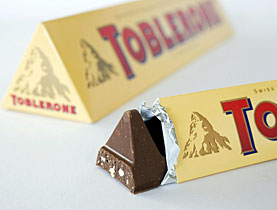Chocolate is champion

The Swiss have long been the world's champion chocolate eaters, and their consumption is going up and up.
Chocosuisse, the umbrella organisation of the Swiss chocolate industry says in its 2007 report that each person in the country got through 12.3 kilograms last year – nearly half a kilo more than in 2006.
It is true that tourists stocking up on gifts to take home help boost the Swiss figures – but that is testimony to the high reputation that Swiss chocolate enjoys.
There was good news all round for the industry in 2007: it achieved record results for both the amount and the value of the chocolate produced. And despite the fact that the Swiss themselves are such avid consumers, over 60 per cent of production goes abroad.
Franz Schmid, director of Chocosuisse, told swissinfo why the Swiss are so good at making chocolate. “It’s our know-how, the quality of the raw material, the processing, the innovation of our products, the love of our profession and our heritage,” he said.
But the Swiss cannot rest on their laurels, as Schmid admitted. Marketing is also an important part of Swiss success.
“We have a good product, and we work very hard. We have competitors abroad who have good products as well. It’s more difficult than it was before to be successful in marketing.”
Switzerland imports as well as exports chocolate, with Germany a major source. But many of these imports are at the cheaper end of the market, where Swiss manufacturers are less interested in competing.
Trends
Recent years have seen an upsurge in the popularity of dark chocolate in Switzerland. There are new ways of eating it too, such as having it together with red wine or whisky.
Chocosuisse, and the 18 manufacturers who are its members, are keen on pushing the health benefits of chocolate, which applies in particular to dark chocolate. Chocolate is a source of polyphenols, whose antioxidant characteristics may reduce the risk of cardiovascular disease and cancer.
Swissness
But what is Swiss chocolate? “If your starting point is the cocoa mass, the final product will be Swiss chocolate. Because you will get the chocolate quality. But if you import chocolate from abroad and you mould and wrap it, it’s not Swiss chocolate,” Schmid explained.
Chocosuisse is keen to protect the reputation of Swiss chocolate, and swoops on any manufacturer that implies a connection to Switzerland which it does not have. Chocosuisse is currently dealing with 50 cases of the misuse of the Swiss label, and although it tries to reach amicable agreements, it will take offenders to court if necessary.
Chocosuisse is looking ahead with confidence. Schmid predicts that consumers will move towards premium products, but also that they will become more interested in the health benefits.
Manufacturers are therefore likely to do more research into the health aspects of the product, and look at ways of highlighting the anti-oxidant properties of chocolate.
“I think consumers are very happy if they can have two things in one,” Schmid commented.
As for jobs in the chocolate industry, things are looking healthy there too. After a period of job cuts as robots took over basic operations, the work force is expanding again.
Good news for all those with a sweet tooth!
swissinfo, Julia Slater
Swiss chocolate sales in 2007 amounted to 181,266 tonnes. Of this 71,657 tonnes were sold in Switzerland, and 109,609 tonnes abroad.
Sales were worth SFr1,662 million ($1512 million dollars)
The main export markets are Germany (18.7%), the UK (13.7%), France (9.6%)and the US (7.9%).
Chocolate was first grown by the Mayas in Central America.
It came to Europe in the 15th century.
Chocolate manufacture started in Switzerland in the 19th century. Swiss pioneers introduced a number of important innovations, including hazelnut chocolate, milk chocolate and filled chocolate.
The conching process, developed by Rodolphe Lindt of Bern, produced smooth chocolate.
The Swiss chocolate industry has been export based since the beginning of the 20th century.

In compliance with the JTI standards
More: SWI swissinfo.ch certified by the Journalism Trust Initiative












You can find an overview of ongoing debates with our journalists here . Please join us!
If you want to start a conversation about a topic raised in this article or want to report factual errors, email us at english@swissinfo.ch.